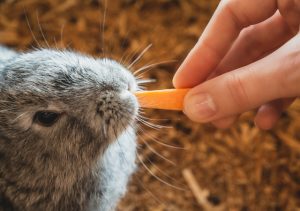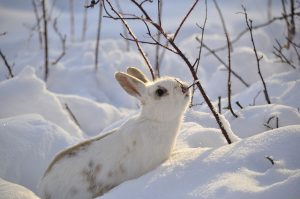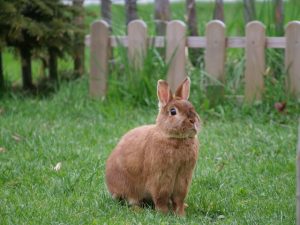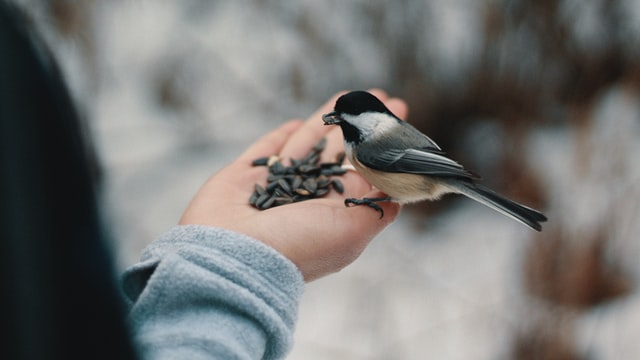
Rabbits are somewhat like people in that they have individual tastes. This means that some rabbits will eat certain foods while others will not go near those food items. This is true even when speaking about the 13 species of Cottontail rabbits.
The birdseed that is produced for birds is coated with an oil base that attracts many animals to the smell.
The rabbits will search for and eat any food they can find that will fill them up. This means if the homeowner happens to spill birdseed and not pick it up, he or she could wake up to wild animals eating it.
Common Foods
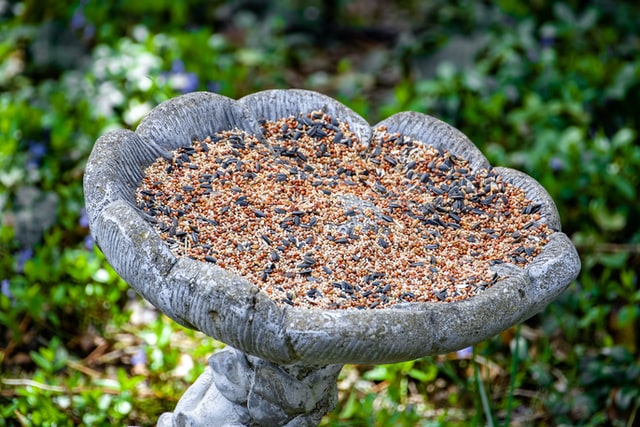
The cottontail for one will search out any foods such as flowers, grasses, bark and leaves. They also search out fruits and vegetables and some even nibble on the wicker baskets around the exterior of the house.
Seeds that sprout are like a delicacy to a rabbit. They can sense these from a distance. The foods most chosen for wild rabbits include flowers, fruits such as apples and grapes, dandelions, clover and goldenrod.
The wild rabbits will eat as much as they can, and also as quickly as they can to store up fat for those times when foods are not as readily or easy to be found.
Issues
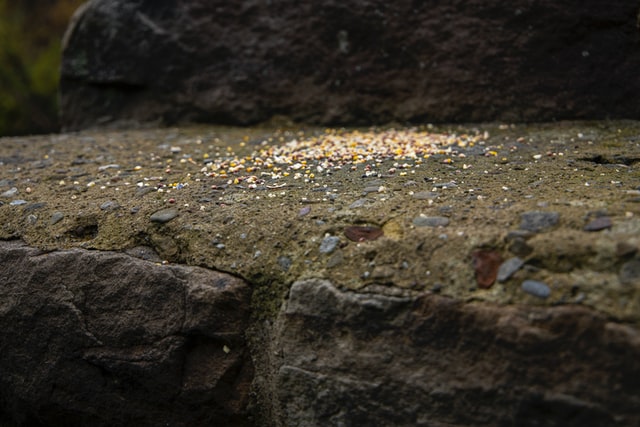
When the rabbit finds the birdseed on a table or spilt on the floor of a patio or the ground, they will eat all that they can. This means they do not leave any for the birds that the seed was meant for.
There are methods used in order to prevent the many issues that can stem from the rabbits eating the birdseed, which include predators hunting birds that are searching for food, or the predators also searching out and taking the baby rabbits that they find in the area.
Do not leave the bird seed out when you are not there. In other words, fill the bird feeders and put the remaining food away in a safe location.
If the birdseed spills, do the best you can to pick it up, or it can be left for other animals to search it out and eat it.
Cottontails are smart enough that they realize they can dig under the fence to get to a yard that is always rife with Sunflower seeds and bird seeds. Since the rabbit has those strong back feet and is accustomed to burrowing holes, diffing down an inch or two in order to get under the fence.
It is not much of a challenge for the rabbit to dig deep enough to get under the fence. This is one reason why it is so imperative that people never feed a rabbit by hand, whether it is bird seed or any other food item. Cotton tails, and other non-domesticated rabbits have the instinct to locate food so they supply their own needs.
Domesticated rabbits should not be left to fend for themselves. The domesticated rabbit should be fed a diet of the recommended foods. This diet should not be strayed from. Not only do the greens, pellets and other foods keep your domesticated rabbit healthy and happy, but it also prevents them from gouging on foods that they should not have.
Rabbits will eat birdseed if given the opportunity. However, birdseed does not supply them with the nutrition that the animal desperately needs. Giving them a little bird seed could be a treat once in a while, but do not make it a habit.
Different Diets
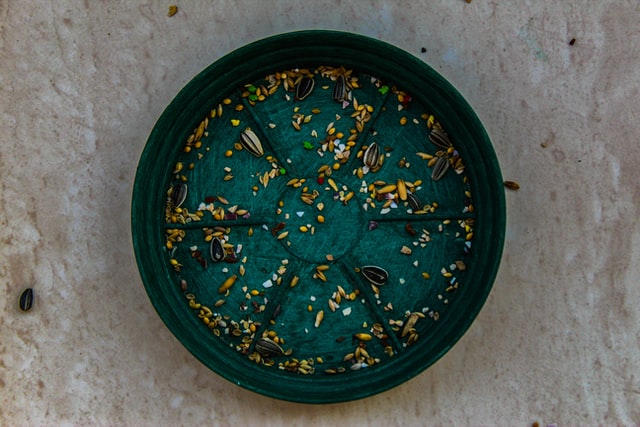
Simply stated, many species of rabbits do have different diet patterns. However, rabbits are herbivores that will eat most types of plants and vegetables found in the wild. The different species will all eat various plants from the wild.
Wild rabbits, if they find birdseed, will eat it and not leave it for the birds it was meant for. The main diet for wild rabbits includes grasses, hay and the lettuce found in the wild. Luckily, birdseed is not something that a wild rabbit will just find in the wild. The birdseed is made and packaged by humans, in order for a wild rabbit to find birdseed, it would have to have been left there by a human.
One point that many humans do not consider is that bird seed is all plant-based. With rabbits, both wild and domesticated, being herbivores, they have no issues eating bird seed.
Bird seed mixes will usually contain a mix of seeds, sunflowers, corn millet, raisins, cherries and peanuts.
When you have verified that the bird seed is completely plant-based, you can give a small amount to the domesticated rabbit and also to the wild rabbits. Again, do not give them a large amount as the seed is not nutritionally complete for the rabbit.
There will be many times that a rabbit will prefer a change to the routine. The same foods each day, every day become monotonous and even the rabbit enjoys a change once in a while.
Many rabbits will also choose to eat birdseed over other foods to conserve energy. They may also have dental issues that make it difficult for them to chew on normal foods. Since the birdseed requires very little chewing, the rabbit will be able to eat it much quicker.
Risks
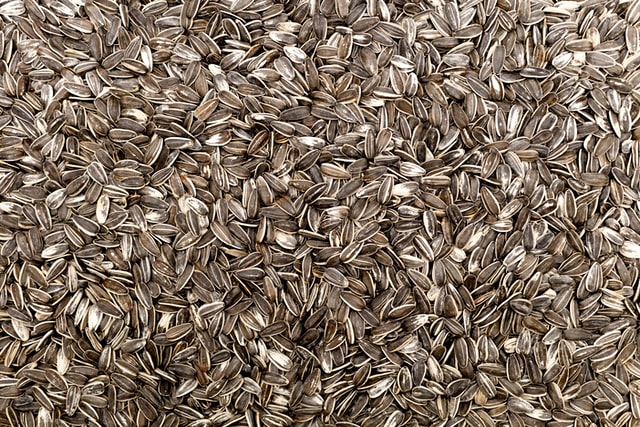
Although the rabbit will enjoy the chance of eating bird seed, there are things to consider before condoning or feeding it to your rabbit. Not only is it not nutritionally complete for your rabbit or the rabbits in the wild, but the ingredients also are not those that are easily digested by the rabbits.
This is not a risk that is noticed right away, therefore, the rabbit will not hesitate to eat the birdseed.
Due to the ramifications of the inability to digest the birdseed as well as other ingredients mixed in, the bird seed mix could be highly detrimental to the rabbit as they cannot digest the seeds.
There are also some bird mixes that contain capsaicin, this is the ingredient used to make peppers spicy. Rabbits cannot have capsaicin as it is detrimental to the rabbit's health, meaning the sensitive digestive system.
Seeds That Are Harmful
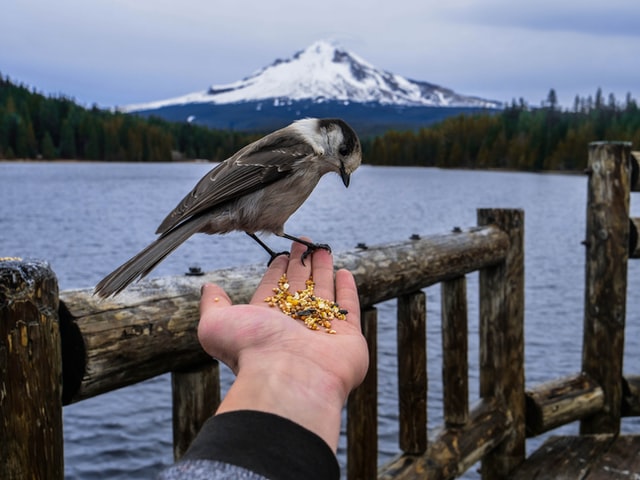
There are some seeds that are harmful to not only rabbits but other animals as well.
Apple seeds contain a chemical called cyanide. However, eating a seed or two is not going to cause total damage. It takes many apple seeds to be detrimental to the rabbit.
Dried Seeds such as the locust bean, dried peas or sweet corn can cause a blockage in the small intestine. Any seeds that are salted should also be avoided.
Peach seeds are similar to apple seeds in the sense that they contain the toxic chemical cyanide. These should be avoided at all times.
Plum Seeds are another seed that contains cyanide and is toxic to animals. These should also be avoided.
Domesticated rabbits rely on their humans to take care of them by giving them proper foods, grooming as needed, visits to the veterinarian and keeping them safe from all dangers.
Therefore as the owner of a domesticated rabbit, be sure you follow the suggested recommendations for your rabbit's daily intake of food. Fresh greens, pellets and even a little fruits and vegetables, along with a good supply of Timothy hay.
The foods all contain the required nutrients needed for the rabbit’s health and will help them remain healthy and happy.
Bird food is one of the hotly debated topics of conversation. Although the birdseed is not part of a nutritional diet, a little amount of birdseed one every so often is like a treat to a domesticated rabbit.
However, allowing them to eat birdseed can actually have some unhealthy ramifications for the rabbit. These seeds are not digestible for the rabbit. So although the birdseed is okay for the rabbit to eat, it should only be in moderation since even a little amount can cause an imbalance in the rabbit's digestive tract.
The one part of birdseed that may actually be beneficial to the rabbit is the fat content in the sunflower seeds. Since rabbits spend the warmer months eating enough food to build a warm layer of fat to survive through the winter months, the foods that do contain some fat are helpful.
Of course, an excess of fat-containing foods can also lead to other issues for domesticated rabbits.
Some of the health issues could be obesity and diabetes. The rabbit could also be diagnosed with cardiovascular disease. Hypertension could also be a result of the fat content in different foods. This is why it is so important to follow a healthy plan for your domesticated rabbit. Feed them the recommended amounts of each of the recommended foods that have been suggested by the Veterinarian.
The amount of bird seed recommended for your rabbit would and should be considered the same for any treats that you would feed your rabbit. Just a small amount every so often, but certainly not all the time or even every day. As with all foods, moderation and balance is the key to the health of your rabbit. A small amount is a key to treats and all creatures.


